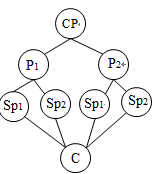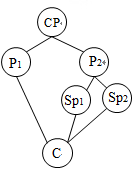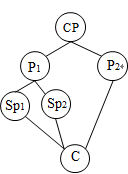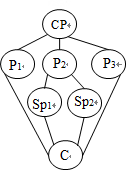1 . Some Facts about Britain
School-leaving age
Children have to stay at school until the age of 16. There is no upper age limit.
Alcohol
You have to be 18 to buy alcohol in a shop, but if you’re 16 and you’re having a meal in a pub, you can drink beer or wine with it.
Motor vehicles
16-year-olds can ride a motorbike of up to 50 cc. At 17 you can ride any bike or drive a car.
Smoking
You can smoke cigarettes at any age, but you can’t go into a shop and buy them until you are 18.
Armed forces
Men can join the army at 16, women at 17. If you’re under 18, you need your parents’ permission.
Marriage
You can get married at 16 with your parents’ permission. Otherwise you have to wait till you’re 18.
Paid employment
You can take a part-time job at 14, and a full-time job at 16 (i.e. when you’ve left school).
Entering Parliament(议会)
The minimum age for becoming a Member of Parliament is 21.
1. What is the passage mainly about?| A.People and employment. | B.Children and smoking. |
| C.Age and the law. | D.Safety and traffic. |
| A.take a part-time job | B.drink beer or wine |
| C.drive a car | D.buy cigarettes |
| A.16 | B.17 | C.18 | D.21 |
| A.people can get married at 18 |
| B.people can buy alcohol in a shop at 16 |
| C.children have to study at school until 18 |
| D.a girl of 17 can join the army without asking her parents |
2 . The Occupy Wall Street protest movement has raised serious questions about the role of capitalist institutions, particularly corporations in American society. Well before the first protester set foot in Zucotti Park, a heckler(扰乱分子) urged Mitt Romney to tax corporations rather than people. Romney’s response-- “Corporations are people” stirred a brief but intense controversy. Now thousands of demonstrators have in effect joined the heckler, denouncing(抨击) corporations as “enemies of the people.”
Far more important than questions about what corporations are is the question of what attitude we should have toward them. Should we, as corporate public relations statements often suggest, think of them as friends (if we buy and are satisfied with their products) or as family (if we work for them)? Does it make sense to be loyal to a corporation as either a customer or as an employee?More generally, even granted that corporations are not fully persons in the way that individuals are, do they have some important moral standing in our society?
My answer to all these questions is no, because corporations have no core dedication to fundamental human values. Such corporations exist as instruments of profit for their shareholders. In fact, left to themselves, they can be serious threats to human values that conflict with the goal of corporate profit. Corporations are a particular threat to truth, a value essential in a democracy, which places a premium on the informed decisions of individual citizens. The corporate threat is most apparent in advertising, which explicitly aims at convincing us to prefer a product regardless of its actual merit. Their defining goal is to generate profit. There are cases when telling the truth is the best means to advance corporate profits. In 1982, when seven people in Chicago died from poisoned Tylenol, Johnson & Johnson appealed to its credo, which makes concern for its customers primary corporate goal,and told the entire truth about what had happened. This honesty turned a potential public-relations disaster into a triumph. But Johnson & Johnson’s impressive corporate credo ends by saying, “Our final responsibility is to our stockholders and must make solid profit. The credo is unclear about what happens when there is a conflict between responsible action and long-term profit.
None of this means that corporations are evil or that socialism should replace the free-enterprise system. As Michel Foucault said of all power structures, it’s not that corporations are bad but that they are dangerous. The self-serving corporate speech that fills our media and halls of government is particularly dangerous for our democracy. At least for this reason, the Occupy Wall Street protesters are right to distrust corporations.
1. Mitt Romney most probably believes that ___________.| A.individuals should pay more taxes than corporations |
| B.corporations should not be forced to pay more taxes |
| C.people should care more about corporations’ development |
| D.corporations should enjoy all the legal rights as people do |
| A.should be set as moral examples of the society |
| B.take employees’ faithfulness as part of their goals |
| C.contribute little to the most essential human values |
| D.are actually means by which people share profits |
| A.corporations always make profits at the expense of people’s health |
| B.customers should always keep an eye on the quality of any product |
| C.corporations take economic profit as their priority essentially |
| D.corporation profit is always in contradiction with customer interests |
| A.Corporations, People and Truth |
| B.Corporations Are Different from People |
| C.Corporations Are Untrustworthy |
| D.The Occupy Wall Street Protest |
3 . There is no doubt eCommerce is growing, and it will continue to grow. However, physical stores would not die as a result of the rise of eCommerce, at least not in the near future. The idea that eCommerce is taking over physical stores has already misguided many people. Physical stores are far from vanishing, and there are some solid reasons for it.
The projections for online spending is optimistic with $150 billion expected to be spent in the coming three years, yet we are also expecting $300 billion in spending at physical stores in the same duration. Do you still think that physical-store shopping is too small to sustain the eCommerce blow?
Even though consumers are staying away from physical stores that follow older concepts, yet we are seeing the rise of fresh concept stores all around the US. We are seeing innovative and attractive success stories of physical stores, ranging from clothes stores to restaurants to health spas. It would be easy to assume that this trend will continue.
Indeed, many shopping malls are dying, yet there are still those shopping centers that are performing well. You can see this for yourself by visiting shopping malls near you. What I want to emphasize here is that not all shopping centers are made equal, just like not all eCommerce retailers are made equal. Both shopping malls and eCommerce sites can lose business if they fail to maintain productivity through improvements and innovations. When you visit shopping centers that are serious about their business, you would see their shops and parking lots packed.
On the other hand, even e-tailers like Amazon have experimented with pop-up shopping concepts. It is important to bear in mind that consumers prefer face-to-face interactions instead of online interactions during shopping, meaning that physical stores are going to stay there.
Still, eCommerce retailers are seeing all of their excitement disappear as they settle the sales tax problem associated with e-tailing. As of now, five states of America have already imposed sales tax on purchases through eCommerce sites, and e-tailers in those states have already witnessed 6 to 12 percent decrease in sales.
This reinforces the fact that physical stores are here to stay, and if you are still undervaluing their growth, you are omitting a huge chunk of the retail representation.
1. The underlined word "projections" in Paragraph 2 probably means____.| A.intentions | B.assessments |
| C.performances | D.predictions |
| A.E-tailers are more creative businesses. |
| B.Fresh concepts help build good business. |
| C.Fewer consumers will visit physical stores. |
| D.Physical stores can’t stand the blow of eCommerce. |
| A.Is Offline Spending Greater Than Online Spending? |
| B.Online Stores V.S. Physical Stores — What’s the Difference? |
| C.Will Physical Stores replace eCommerce in the Near Future? |
| D.Does eCommerce Success Mean Physical Stores Will Disappear? |
CP: Central Point P: Point Sp: Sub-point (次要点) C: Conclusion
A. | B. |
C. | D. |
| A.That kept cities very small. |
| B.The rest live in small towns. |
| C.The effects of urban living on people should be considered. |
| D.Soon many other industrial nations became urban societies. |
| E.But even 200 years ago, only a few people could live in cities. |
| F.Modernization drew people to the cities and made farmers more productive. |
| G.Modern cities have destroyed social relations and the health of human beings. |



